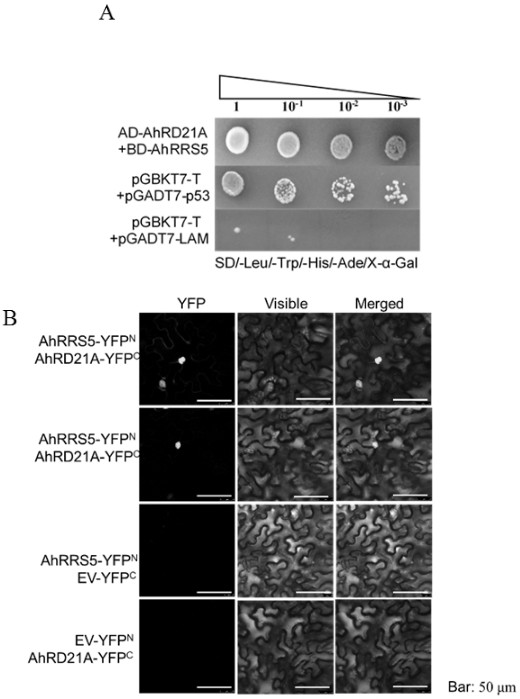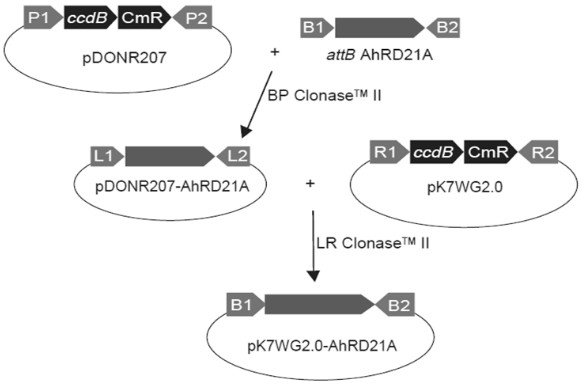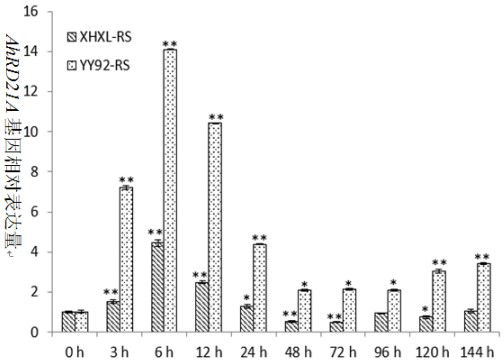Peanut cysteine protease encoding gene AhRD21A as well as expression vector and application thereof
A technology of cysteine protease and coding gene, applied in application, genetic engineering, plant genetic improvement, etc., can solve problems such as threats to food safety, life and health, economic losses in peanut production, and pesticide residues
- Summary
- Abstract
- Description
- Claims
- Application Information
AI Technical Summary
Problems solved by technology
Method used
Image
Examples
Embodiment 1
[0016][Example 1] AHRD21A and AHRRS5 interaction verification
[0017]The cDNA of the peanut oil 92 is used as a template with anti-Blue blight cultivation species.Ahrd21a withAhrrs5 (CN104480117A) Full length CDS sequence is connectedpgad In the T7 (AD) and PGBKT7 (BD) vectors, the yeast strain Y2H GOLD was circulated, and PGADT7-T and PGBKT7-P53 were used as a positive control, PGADT7-T and PGBKT7-LAM as a negative control, in the second acknowlednerability SD- TRP / -LEU culture gains a transformed positive transformant, and a gradient dilution is used to grow a positive clonal sub-positive cloning point in four deficient medium SD-TRP / -LEU / -HIS / -ADE / X-α-Gal / ABA. 5 days later, transformed positive clones in 10-110-210-3Different dilutions can grow normally and blue, and the positive control is also blue clone, and the negative control is not growing, indicating that there is interaction between AHRD21A and AHRRS5.figure 1 A).
[0018]The Gateway system will be separatelyAhrd...
Embodiment 2
[0019][Example 2]Ahrd21a Excessive expression vector construction and verification
[0020]according toAhrd21a Full length gene CDS sequence, design specific primer
[0021]AHRD21A-ATTB1-F: Ggggacaagttgtacaaaaaaagcaggcttcatgcttcatccttccccc;
[0022]AHRD21A-ATTB2-R: GgggacccttgtacaagaAagctgggtcagcactgctcacccattgaag.
[0023]CDNA of peanut oil 92 in anti-blue bumper was carried out in PCR amplification as a template, using Takara's high-fidelity enzyme primestar®MAX amplified, PCR reaction system: 1 μL of cDNA as template, 10 μL 2 × primestar®Max Mix, the positive and actuator is 0.5 μL, hydrating to 20 μL. Reaction conditions: 95 ° C prevalence 5 min; 95 ° C 30 S, 55 ° C 30 S, 72 ° C 3 min, 25 cycles. PCR product agarose gel electrophoresis was subjected to BP reactions to the PDONR207 no-load connection, 1 μL of the PDONR207, 1 μL, BP enzyme 0.25 μL, 25 ° C, and Night, 2 ° C The product was converted to E. coli DH5α sensitudinal cells, screening positive clones were sequenced, correctly read cl...
Embodiment 3
[0024][Example 3]Ahrd21a Expression mode analysis after anti-and hyperbraese peanuts
[0025]For analysisAhrd21a Genes in anti-and hyperbrapasculent peanuts in response to the expression differences of cyprotype infestation, this study adopts real-time fluorescent quantitative PCR method confrontation, soft blight peanut materials Yue oil 92 (YY 92) and new particles (XHXL) After the shear leaf method is treated with cypros, the expression of the gene is analyzed at different time points. Design of the fluorescent quantitative PCR primers (AHRD21A-QPCR-F: CTaaggtgtgtgaacatgatga, AHRD21A-QPCR-R: CacatctTcctgtgtgaatca), using CTAB method to extract the total RNA of peanut leaves before and afterfeeding infection, according to PrimescriptTM Reverse Transcriptase Reverse enzyme (Purchased from Takara Company) The instructions were subjected to 1 μg of total RNA to synthesize single-stranded cDNA, dilute a single-stranded cDNA, 2 μL as a template, with aHactin as an intercephase gene (AHACT...
PUM
 Login to View More
Login to View More Abstract
Description
Claims
Application Information
 Login to View More
Login to View More - R&D
- Intellectual Property
- Life Sciences
- Materials
- Tech Scout
- Unparalleled Data Quality
- Higher Quality Content
- 60% Fewer Hallucinations
Browse by: Latest US Patents, China's latest patents, Technical Efficacy Thesaurus, Application Domain, Technology Topic, Popular Technical Reports.
© 2025 PatSnap. All rights reserved.Legal|Privacy policy|Modern Slavery Act Transparency Statement|Sitemap|About US| Contact US: help@patsnap.com



